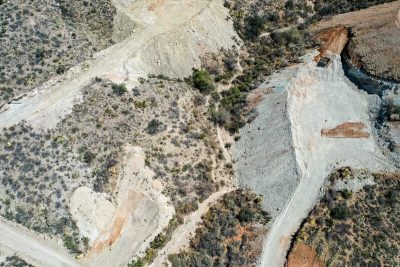Mining Company Told to Stop Illegal Dumping in Arizona’s Santa Rita Mountains
New Aerial Photos Show Rosemont Copper World Project Burying Washes in Dirt, Rocks

All Global Research articles can be read in 51 languages by activating the “Translate Website” drop down menu on the top banner of our home page (Desktop version).
To receive Global Research’s Daily Newsletter (selected articles), click here.
Visit and follow us on Instagram, Twitter and Facebook. Feel free to repost and share widely Global Research articles.
***
Conservation groups filed a formal notice today of their intent to sue an international mining company to protect critical desert streams and washes in southern Arizona’s Santa Rita Mountains.
Today’s notice says Toronto-based Hudbay Minerals is violating the Clean Water Act by dumping dirt and rocks into a wash at the company’s proposed Rosemont Copper World Expansion, on private land on the western slope of the Santa Rita Mountains. Federal laws require a permit before discharging anything into U.S. waterways.
“It’s appalling to see Rosemont running roughshod over the feet of these beautiful mountains,” said Allison Melton, an attorney at the Center for Biological Diversity. “This may be private property, but the company doesn’t have the right to pollute waters our communities and wildlife need to survive. We’re putting Rosemont on notice that it needs to stop operations now and go through the Clean Water Act permit process.”
Rosemont, a Hudbay subsidiary, intends to ramp up grading and clearing the 3,500-acre site southeast of Sahuarita this month, but it has not applied for a Clean Water Act permit with the U.S. Army Corps of Engineers.
Aerial photos taken earlier in April show soil and rocks spilling into and filling portions of a wash, part of a network of ephemeral streams that flow across the proposed mine site and downstream to the Santa Cruz River.
“After years of declaring little or no interest in the western slopes of the Santa Rita Mountains, Rosemont is now showing their true hand,” said Gayle Hartmann, board president of Save the Scenic Santa Ritas. “They want to pursue complete and utter destruction of the ridgeline and slopes of the northern Santa Ritas. An almost certain outcome would be serious impacts to our already fragile watershed, in particular washes that support the Santa Cruz River. We’re not going to stand by and let the company ignore federal law as they significantly deface a beloved, local sky island.”
Rosemont’s original copper mine plans, on the east side of the Santa Rita Mountains, have been stymied by multiple losses in court. The westside expansion proposal calls for two new open pits and three tailings waste piles, where it would dump at least 64 million tons of waste. It intends to fill the washes and streams throughout the mine site and connect to its proposed Rosemont Copper mine.
“This wanton destruction of desert washes is unconscionable and inconsistent with the mandates of the Clean Water Act,” said Sandy Bahr, director for Sierra Club’s Grand Canyon Chapter. “We simply cannot stand by and allow this multinational mining company to harm our precious Arizona waters.”
Washes and other ephemeral streams like those on the mine expansion site play a vital role in maintaining the chemical, physical and biological health of waters downstream. In addition to the buried wash, the Center’s aerial photos showed a vast network of roads, grading and hillside excavation.
“Once again Hudbay feels it’s above the law in its quest to mine the Santa Rita Mountains,” said Roger Featherstone, director of the Arizona Mining Reform Coalition. “As U.S. courts have found, Hudbay’s plans to mine at Rosemont are illegal. Now, instead of revising their Rosemont plan to obey the law, the Canadian mining company has come up with a bizarre plan to cobble together a project that would destroy the west side of the Santa Rita Mountains. This plan clearly violates the Clean Water Act and we have no choice but to go to court to stop this blatant violation of federal law.”
Last week EarthJustice, representing three Arizona Tribes, sent Hudbay a similar notice of intent to sue over violations of the Clean Water Act at the expansion site.
The 60-day notices are required before filing a lawsuit to compel the company to comply with the Clean Water Act. Rosemont can avoid the violations by suspending work at the site.
On the other side of the mountain range, Rosemont still wants to blast a mile-wide, half-mile-deep pit, as well as pile toxic mine tailings and waste rock hundreds of feet high across nearly 2,500 acres in the headwaters of Davidson Canyon, a tributary to Cienega Creek, which replenishes Tucson’s groundwater basin. The mine would also destroy prime jaguar habitat — land that’s critical to the survival and recovery of jaguars in the United States and has been home to a jaguar known as El Jefe.
The Rosemont Mine has faced numerous legal challenges.
In 2017 the conservation groups filed a lawsuit challenging the U.S. Forest Service’s approval of the mine, and in 2019 a judge overturned the agency’s approval and the underlying environmental analysis for the mine project, sending both back to the Forest Service. Hudbay and the U.S. Justice Department appealed, and that appeal is pending before the 9th U.S. Circuit Court of Appeals.
In September 2017 the Center sued to challenge a biological opinion from the U.S. Fish and Wildlife Service that determined the mine would not jeopardize threatened and endangered species in the area. In 2020 a district court struck down the biological opinion, and that ruling was not appealed.

Aerial photo of Rosemont Copper World expansion, Santa Rita Mountains, Arizona. Photo credit: Center for Biological Diversity Images are available for media use.
*
Note to readers: Please click the share buttons above or below. Follow us on Instagram, Twitter and Facebook. Feel free to repost and share widely Global Research articles.

